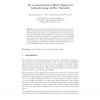Free Online Productivity Tools
i2Speak
i2Symbol
i2OCR
iTex2Img
iWeb2Print
iWeb2Shot
i2Type
iPdf2Split
iPdf2Merge
i2Bopomofo
i2Arabic
i2Style
i2Image
i2PDF
iLatex2Rtf
Sci2ools
ICCSA
2009
Springer
2009
Springer
On a Construction of Short Digests for Authenticating Ad Hoc Networks
In pervasive ad-hoc networks, there is a need for devices to be able to communicate securely, despite the lack of apriori shared security associations and the absence of an infrastructure such as a PKI. Previous work has shown that through the use of short verification strings exchanged over manual authentication channels, devices can establish secret session keys. We examine a construction of such a cryptographic digest function for deriving the verification string, and propose an improved construction, with weaker assumptions. We further provide a concrete instantiation which is efficient, based on finite fields.
Applied Computing | Apriori Shared Security | ICCSA 2009 | Pervasive Ad-hoc Networks | Verification String |
| Added | 20 May 2010 |
| Updated | 20 May 2010 |
| Type | Conference |
| Year | 2009 |
| Where | ICCSA |
| Authors | Khoongming Khoo, Ford-Long Wong, Chu-Wee Lim |
Comments (0)

